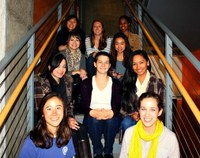 The Mentorship Program with the Foods for Health Institute offers a unique learning opportunity for UC Davis students.
The Mentorship Program with the Foods for Health Institute offers a unique learning opportunity for UC Davis students.
Created by Jennifer Smilowitz, Associate Director of Human Studies Research at the Foods for Health Institute, the Mentorship Program exposes undergraduate students and visiting scholars to research in a professional setting, encourages the development of critical thinking and communication skills, and sharpens their ability to undertake quality research projects.
For more information about the Mentorship Program or opportunities to conduct research in labs affiliated with the Foods for Health Institute please email jensm@ucdavis.edu.
Program Details
This program offers a unique learning opportunity for UC Davis students enrolled in Nutrition, Food Science and Technology, and various other science programs. Created by Dr. Jennifer Smilowitz, Associate Director of Human Studies Research at the Foods for Health Institute, the Mentorship Program exposes undergraduate students to research in a professional setting, encourages the development of critical thinking and communication skills, and sharpens their ability to undertake quality research projects.
Students in good academic standing who have advanced through their first year at UC Davis are invited to fill out an application by their undergraduate department advisors. Students successfully complete a writing assessment and in-person interview to be selected for the Mentorship Program. Dr. Smilowitz conducts a formal welcome orientation for new students where they learn about the Foods for Health Institute generally and the Mentorship Program specifically.
The impetus for the Mentorship Program came from Dr. Smilowitz’s research on infants and breastfeeding mothers. Students are first trained in the area of professionalism for subject interaction and for protecting subjects’ privacy. This training is required to enroll subjects for all Foods for Health Institute’s clinical trials, disseminate information, and conduct community outreach. Students also oversee the inner workings of a clinical trial which include administering in-person or phone questionnaires; conducting clinical assessments; procuring and processing samples; assembling sample collection supplies for subjects; logging and annotating data on samples into databases; and analyzing data.
Before students start work in the laboratory setting, they complete lab training where they learn basic laboratory skills, biological and chemical safety, and sample handling. This introductory training instills the confidence necessary to safely conduct lab protocols. Students are required to engage in online literature research; draft laboratory protocols; isolate molecules from biological samples; prepare biological samples for the identification and measurement of the molecules of interest; prepare solvents and solutions required to prepare samples for measurement and much more. The breadth of professional skills that students gain is perfected throughout their time in the program.
While students may spend time on one significant task, Dr. Smilowitz stresses that the program is designed to “personalize” students’ roles based on their career interests. She says, “students rotate through all procedures several times in order to diversify their skill set and gain exposure to all procedures. Once the students determine what they enjoy most—whether clinical or lab related—they are provided the opportunity to spend the majority of their time in those areas of interest.” The Mentorship process results in a well-rounded, hands-on lab education where students gain experience with many aspects of conducting a clinical study and executing research; however, the training does not stop at the lab. Dr. Smilowitz holds regular research training sessions that are designed to help the students in their careers at UC Davis.
Students work beyond clinical tasks, and at the end of each quarter they are required to complete a comprehensive project. Dr.Smilowitz provides students with the tools to build a bibliography library, conduct online literature research, and the fundamental skills for writing a research paper and proposal. Students are expected to continually work on the project throughout the quarter and meet with Dr. Smilowitz weekly or bi-weekly to discuss their progress. After the research has been conducted students have the choice between writing a review paper, giving an oral presentation and writing a research proposal on their designated topic.
Research, writing, and effective communication are critical components of undergraduate education, and Dr. Smilowitz has plans to expand the Mentorship Program and the types of activities that students can participate within the Foods for Health Institute. Dr. Smilowitz recruits Mentorship participants to assist with funding issues like grant writing and research, and to develop professional communication skills by interfacing with faculty or interviewing clinical subjects.
Through the Undergraduate Mentorship Program, Dr. Smilowitz has created a mutually beneficial research learning opportunity for undergraduate students. Students are able to contribute to lab work, and to an even greater extent Dr. Smilowitz is able to mentor these students and provide them with invaluable skills. For more information about the Mentorship Program or opportunities to conduct research in labs affiliated with the Foods for Health Institute please email: jensm@ucdavis.edu